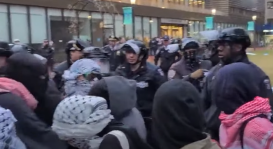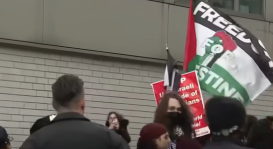With statistics that show up to 86 percent support rate for President Bush among evangelical Christians, many media gurus and political analysts have oft-viewed “Christian evangelical churches” and “the Grand Old Party” as synonymous entities.
According to one estimate, more than eight out of ten white evangelical Protestants voted for Bush in 2000, and some believe the Republican Party will garner an even greater support at the upcoming November election.
"I just think George W. Bush has been the evangelical president," said Geoff Layman, an associate professor of government and politics at the University of Maryland. "I can't see any reason for the evangelical community not to just love Bush, and I think they do."
Many have criticized this apparent affiliation and accused Evangelical leaders of promoting the Republican party.
However, time and time again, lead figures in the Evangelical arena have clarified that the support does not stand on party lines, but rather on faith-based policies that reflect the conservative voice; Bush’s decisions on critical issues such as abortion, homosexual marriage and terrorism has consistently mirrored the sentiments of conservative American Christians.
Last week, the National Association of Evangelicals (NAE) released a draft statement entitled “For the Health of the Nation: An Evangelical Call to Civic Responsibility.” While the statement, which took several years in the making, is not yet complete, its general message is clear: “be careful not to equate Christian faith with partisan politics.”
The statement encourages Evangelical Christians to get involved in civic affairs and to join political parties, but it also advises against “unquestioning patriotism”.
Christians “must keep their eyes open to the potentially self-destructive tendencies of our society and our government.''
''What they're trying to say is 'Don't link the Christian message with a party, so that people link your religion with a political ideology,' '' said Michael Cromartie, vice president of the Ethics and Public Policy Center, upon analysis of the statement. ''They're warning 'Don't confuse the Gospel with a political movement.' ''
The National Association of Evangelicals, with 50 million followers, is one of two cornerstones of the American Evangelical Protestant faith. The other powerful and massive body of evangelicals is the Southern Baptist Convention (SBC). The SBC is not only the largest denomination in the U.S. with more than 16 million members, it is also the largest Baptist denomination in the world.
Earlier this year, President Bush was greeted with thunderous applause and cheers from members of the NAE and SBC, when he addressed them via satellite during their annual conventions.
With such obvious support, the Bush-Cheney ’04 campaign coalition began targeting SBC and NAE pews, circulating a document that called on evangelical pastors to provide a “directory” of nearby conservative churches to the campaign and encourage their congregants to vote for Bush.
According to the SBC’s newsletter Baptist Press, the instructions on the sheet listed 22 responsibilities of evangelical pastors, which included:
--“Send your Church Directory to your State Bush-Cheney ’04 headquarters or give [it] to a BC04 Field Rep.
-- “Identify another conservative church in your community who you can organize for Bush.
-- “Talk to your Pastor about holding a Citizenship Sunday and Voter Registration Drive.
-- “Begin to organize a voter registration drive at your church.
-- “Talk to your Church’s seniors or 20-30 something group about Bush/Cheney ’04.
-- “Finish calling all Pro-Bush members of your church and encourage them to vote.”
It also instructed church leaders to host a “Party for the President” on two occasions with church members, and to distribute “voter guides on two Sundays before the election.”
This vigorous campaign effort apparently backfired.
In a July 2 statement to the Baptist Press, the SBC’s public spokesperson Richard Land said he is “appalled that the Bush-Cheney campaign would intrude on a local congregation in this way.”
“It’s one thing for the church to have a voter registration drive, to seek to inform church members on public policy issues, to encourage church members to fulfill their Christian duty and vote, and to encourage them to vote their values, beliefs and convictions. It’s another thing entirely for a partisan campaign to ask church members to bring in church directories for use as contact lists by the campaign and to seek to come into the church and do a voter registration drive and distribute campaign literature,” said Land, president of the Ethics and Religious Liberty Commission in the SBC.
Land, who has been a personal friend of President Bush since before his presidency, expressed fears that pastors will recoil at the campaign.
“I suspect that [the Bush-Cheney effort] will rub a lot of pastors’ fur the wrong way,” said Land. “Many pastors may consider this a totally inappropriate intrusion by a partisan campaign into the nonpartisan voter education and voter registration ministries of local churches. I am fearful that it may provoke a backlash in which pastors will tell their churches that because of this intrusion the church is not going to do any voter registration or voter education, and that would be tragic.”
Land elaborated, saying that if he were a pastor, he would tell congregants that giving church directories to a campaign is a “violation of the trust of your fellow church members and of the body collectively, just as it would be inappropriate to share it with a marketing group.”
Richard Cizik, the vice president of governmental affairs for the NAE, agreed, observing that “an overzealous campaign worker” may have “stepped over the line of appropriate behavior.”
“[W]hen party officials, whether Republican or Democrat, do that, it’s simply the obligation of church members to determine what is appropriate, ethical and legal and to say, ‘No’.” said Cizik.
While the campaign spokesperson Sharon Castillo defended the effort, saying that the “approach is peer to peer contact” and that they are “just trying to engage more of our fellow citizens in the political process,” Land and Cizik turned a skeptical eye.
“The bottom line is -- when a church does it, it’s nonpartisan and appropriate. When a campaign does it, it’s partisan and inappropriate,” Land said. “It’s one thing for a church member motivated by exhortations to exercise his Christian citizenship to go out and decide to work on the Bush campaign or the Kerry campaign. It’s another, and a totally inappropriate, thing for the Bush campaign or the Kerry campaign to use such workers who may be church members to go in and seek church member information through the use of directories to solicit partisan support.”
Cizik said his advice is for “everyone, especially pastors and church leaders ... to determine where the bright line of the law is and take one step back. That way no one can accuse the church of engaging in partisan politics or, for that matter, party officials of inappropriately targeting churches.”
The Bush-Cheney effort “just fosters the impression that evangelical churches are in some kind of inappropriate collaboration with the Republican Party in the same way that African-American churches at times have appeared to have a close collaboration with the Democratic Party,” Cizik said. “Both strike a lot of Americans as smarmy.”







